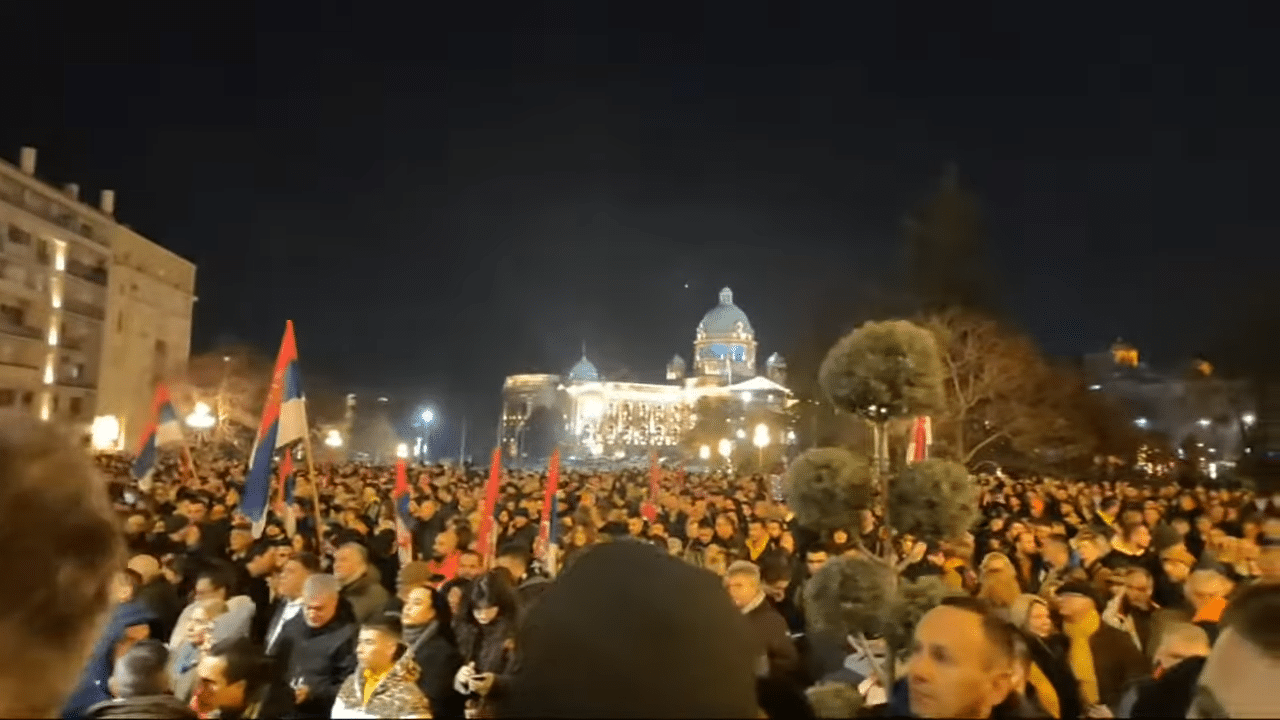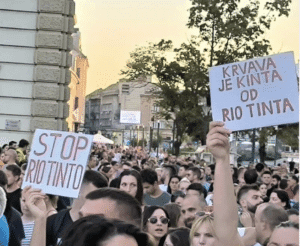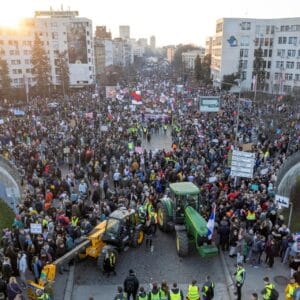Protesters outside Belgrade’s city assembly after the 2023 local elections. Source: Wikimedia.
Serbian voters in 88 municipalities went to the polls for local elections on Sunday June 2. The ruling SNS coalition has emerged victorious in most, if not all municipalities. It managed to secure an absolute majority in the Belgrade city assembly, markedly improving the result of the December 2023 elections. Once again, the elections were marred by accusations of irregularities and election fraud.
Results
Although some results are still coming in, the SNS and its allies have proclaimed victory with President Vucic calling it ‘pure and convincing.’ In Belgrade, the SNS coalition significantly improved its position as it achieved nearly 53% of votes, 13% more than the 2023 election, which hands them a majority in the city assembly. Well-known conspiracy theorist Branimir Nestorovic and his We- The Power of the People Party got 8% of votes.
Turnout was just over 46% in Belgrade which is more than 10% lower than in the previous election. This is likely due to disillusionment within the opposition camp after their coalition fell apart over the issue of strategic boycotts. Whereas the united opposition was able to garner around 35% of the votes last year, the opposition list We Choose Belgrade now only got a little over 12% of votes. The Kreni-Promeni (Move-Change) movement under the leadership of Savo Manojlovic, known for his actions against lithium mining, got 17.5% of votes. Manojlovic stated that his alliance would not recognize these results, calling it ‘(…) the most irregular elections ever’.
In other cities, the SNS also won convincingly. In the second largest city, Novi Sad, it got an absolute majority with a little over 50% of votes. The fractured coalition movement got 24% of votes there.
Arguably the best result from an opposition viewpoint were those in Nis where the SNS coalition did not secure a majority. Dragan Milic, a well-known cardiovascular surgeon, won 24% of the vote with opposition coalition We Choose Nis getting close to 16% percent. Milic did not sign a protocol of non-cooperation with the SNS earlier this year but has now claimed there will be no cooperation with the SNS in Nis. This could create possibilities to form a non-SNS majority in the city.
Irregularities and election fraud
As was the case in the previous elections, national NGO’s as well as opposition figures reported dozens of irregularities such as vote buying and pressure on voters. CRTA observed many instances of voters photographing their ballot, suggesting outside pressure or incentives to vote. The illegal registration of voters and the party they voted for strengthens this suspicion. It also reported voter migration to the capital. The SNS also reportedly set up calling centres to persuade voters to come out and vote for them on election day. Skirmishes broke out near such a calling centre in Novi Sad with riot police firing teargas at opposition members and journalists allegedly trying to enter the building.
A more structural issue that has affected the outcome of Serbian elections for years now, is the blurring of state and party resources. The SNS and its allies have used their domination of the media landscape to push out their message to large parts of the population. It has consistently used nationalist rhetoric, labelling the opposition as ‘traitors and foreign mercenaries’. The opposition lacks the resources to effectively campaign and clearly operates in an uneven playing field. The OSCE Office for Democratic Institutions and Human Rights (ODIHR) published a statement of preliminary findings. In it they state that the elections were ‘well run and freedom of expression and assembly were respected, but the dominance of the ruling party as well as the fragmentation of the opposition reduced their competitiveness, while allegations of widespread pressure on public sector employees and misuse of public resources favoured the ruling coalition.’
Looking forward
The results of these election further cement the SNS’s grip on power in Serbia. Although virtually all municipalities were already controlled by the SNS and its partners due to the 2020 opposition boycott, these elections were considered a litmus test for the opposition. It was not able to gain a majority in any major urban centres, including in Novi Sad and Belgrade where some expected them to be able to mount a serious challenge. The breakdown of the coalition, combined with the overwhelming institutional advantage of the ruling party, is likely the reason for their lack of success in these elections. If there are no snap elections, which the SNS government has called 4 times since it came to power, the next parliamentary election is to be held in late 2027. For the opposition, it is crucial to form a united front if it wants to stand any chance against Vucic and his SNS party.
Another triumph for Vucic means a triumph for anti-EU, vehemently nationalist and pro-Russian rhetoric which is likely to move Serbia further away from its stated ambition to join the European Union. It seems a crucial moment for the EU to finally, strongly condemn these electoral abuses and hit the Vucic administration where it hurts. The conditionality of EU support for Serbia, the largest recipient of EU grants in the Western Balkans, should be more strongly enforced. An assertive and strict EU stance seems the only way to move Serbia off its increasingly authoritarian course.



